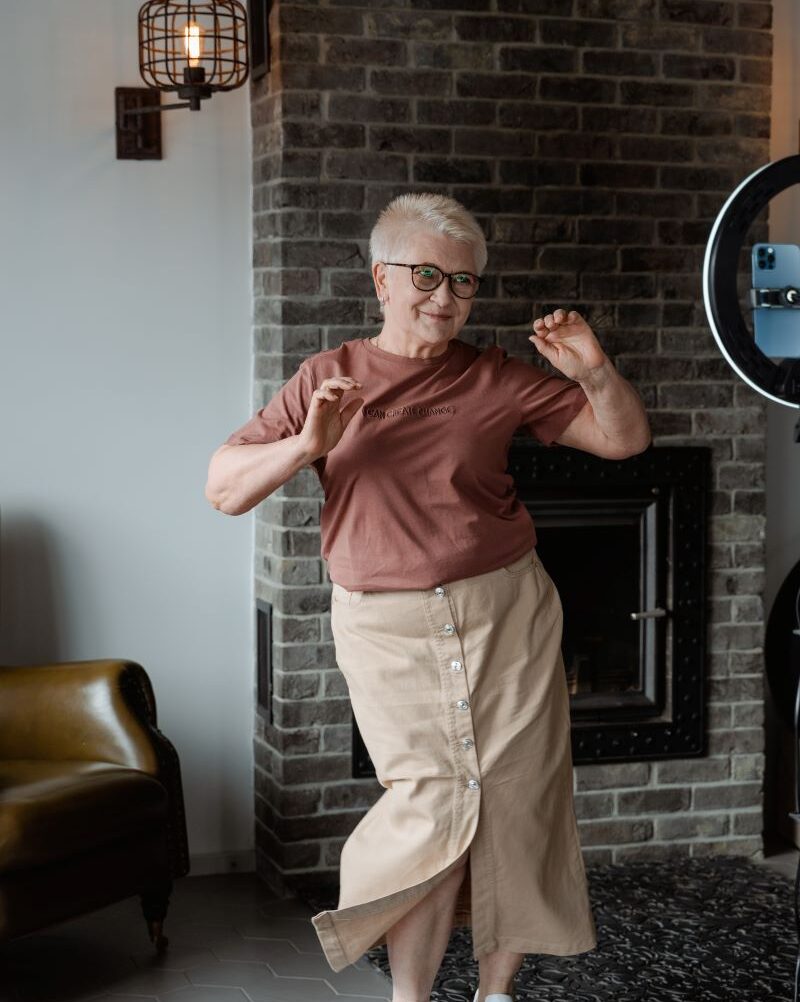
The notion that advanced age inevitably equates to declining senior healthcare is being upended by a new wave of Americans who are being proactive in prioritizing their physical, mental, and emotional well-being.
From innovative exercise regimens tailored for older adults to holistic approaches that address the mind-body connection, this emphasis on health goals is reshaping perceptions about aging and inspiring individuals to take control of their own health destinies.
With older Americans disproving outdated stereotypes and embracing vibrant lifestyles, the implications for senior whole health are profound – challenging long-held assumptions about the inevitability of age-related ailments and sparking a revolution in senior healthcare.
Senior Whole Health Trends in Being Proactive About Good Health
In the current landscape of senior healthcare, older Americans are taking a proactive approach to their health. With advancements in medical technology and increased awareness of the importance of nutrition and exercise, many older individuals are actively engaging in activities to maintain and improve their health.
From participating in strength training programs to adopting healthier dietary habits, this demographic is focused on enhancing their overall well-being. A recent study supported these findings by using trends over a 10-year period in a sample of more than 5 million older Americans. It focused on two key areas: activities of daily living and functional limitations among seniors aged 65 and older.
Findings showed limitations have decreased in both areas over the past decade, reflecting improved senior whole health improvements.
Also, the shift toward preventative care has led to an increase in physical screenings and check-ups among older Americans. Being proactive not only helps detect potential health issues early on but also empowers individuals to take control of their own health goals.
Older adults are embracing a more holistic view of wellness by incorporating mental and emotional health practices into their routines, emphasizing the importance of mindfulness and stress-reduction techniques. Overall, these trends signify a positive trajectory toward improved longevity and quality of life for older Americans.
Improved Access and Quality Equals Improved Senior Health Care
 Improved access and quality have played significant roles in the overall health improvements seen among older Americans. With advancements in technology, telemedicine has emerged as a convenient means for older adults to connect with healthcare professionals.
Improved access and quality have played significant roles in the overall health improvements seen among older Americans. With advancements in technology, telemedicine has emerged as a convenient means for older adults to connect with healthcare professionals.
This has not only increased accessibility but also improved the quality of care by enabling individuals to seek medical assistance for any aspect of their senior whole health without leaving their homes.
Furthermore, the emphasis on preventive care and chronic disease management has resulted in better health outcomes for older individuals. By promoting regular screenings, vaccinations, and lifestyle interventions, healthcare providers are being proactive in addressing potential health issues before they escalate.
This holistic approach not only ensures better access to timely care but also focuses on enhancing the overall quality of life in conjunction with senior health care. These concerted efforts have contributed to a positive shift in the perception of aging, fostering an environment where older individuals can lead healthier and more fulfilling lives.
It’s imperative to recognize that while there have been vast improvements in senior whole health access and quality for older Americans, there is still work to be done. By continuing to prioritize innovation and tailor services to meet the specific needs of this demographic, well-being can be further enhanced to ensure that they continue to benefit from high-quality senior healthcare services and to health goals.
Increased Emphasis on Senior Whole Health and Preventative Care
With a growing emphasis on preventative care, older Americans are experiencing a major shift in their approach to healthcare. The traditional mindset of fixing things when they break is being replaced by being proactive and adopting an attitude centered around maintaining health and wellness.
This evolving approach with improved health goals involves regular check-ups, screenings, vaccinations, and lifestyle modifications aimed at preventing diseases before they even occur.
Furthermore, the increased emphasis on preventative care is not only impacting individuals but also the senior whole health system. With a focus on early detection and intervention, costs can be reduced by preventing costly chronic conditions and hospitalizations.
This shift toward prevention has the potential to significantly improve the quality of life for older Americans while also easing the burden on the healthcare system. As this trend continues to gain momentum, it’s clear that preventative care is becoming an essential component of healthy aging for older adults across the country.
Health Goals: Benefits of Active Lifestyles and Exercise
Living an active lifestyle and engaging in regular exercise not only have immediate physical benefits but also contribute to improved mental and emotional well-being. Studies have shown that older adults who maintain an active routine experience reduced risk of chronic illnesses such as heart disease, diabetes, and osteoporosis.
Exercise as part of wellness also promotes better cognitive function, helping to stave off age-related decline in memory and decision-making abilities. Moreover, the social aspect of participating in group activities or sports can lead to increased social connections and a greater sense of community, which positively impacts overall mental health.
In addition to the physical and mental advantages, staying active can also significantly enhance longevity and quality of life for older Americans. Research has indicated that regular exercise can slow down the aging process at a cellular level, leading to improved endurance, strength, flexibility, and stamina – all essential components for maintaining independence in later years.
By incorporating exercise into their daily routines, older individuals can actively manage their own care while enjoying an improved sense of vitality and well-being. This shift toward being proactive to aging not only benefits the individual but also represents a broader societal shift towardsviewing the aging population as valuable contributors with much to offer.
Senior Healthcare Advances in Medical Technology for Elderly
Medical technology for the elderly has seen remarkable health goals advancements in recent years, revolutionizing the way we approach senior health care for older individuals. From wearable devices that monitor vital signs in real-time to robotic exoskeletons that aid in mobility, the possibilities are endless.
These innovations, combined with being proactive, not only enhance the quality of life for seniors but also enable them to live independently for longer periods as part of the entire senior whole health package.
 Telemedicine has also emerged as a game-changer, allowing elderly patients to connect with senior healthcare providers from the comfort of their homes. This is particularly beneficial for those living in remote areas or with limited mobility. Additionally, personalized medicine and genetic testing have opened new frontiers in tailoring treatments specifically to an individual’s unique genetic makeup, leading to more effective and targeted therapies for age-related conditions.
Telemedicine has also emerged as a game-changer, allowing elderly patients to connect with senior healthcare providers from the comfort of their homes. This is particularly beneficial for those living in remote areas or with limited mobility. Additionally, personalized medicine and genetic testing have opened new frontiers in tailoring treatments specifically to an individual’s unique genetic makeup, leading to more effective and targeted therapies for age-related conditions.
Furthermore, advancements in surgical techniques such as minimally invasive procedures have reduced recovery times and complications for elderly patients. These breakthroughs signify a paradigm shift in geriatric care, offering hope and improved outcomes for older Americans as they continue being proactive and leading healthier and more active lives.
Senior Whole Health: Mental Health and Social Well-Being
As older Americans continue to prioritize their physical health, the importance of mental well-being and social connections cannot be understated. Research indicates that maintaining strong social connections can contribute positively to mental health, leading to a sense of belonging and reduced feelings of isolation.
Older adults who engage in regular social interactions tend to exhibit better cognitive function and overall emotional well-being.
Also, addressing mental health concerns among older adults is crucial for promoting a higher quality of life. By integrating mental health support services into community programs and senior healthcare facilities, older Americans can be ensured of having access to the resources they need for optimal well-being.
Additionally, creating age-friendly environments that foster opportunities for meaningful social engagement can greatly impact the mental and emotional resilience of this demographic. Recognizing the intersection between mental health and social well-being is paramount in supporting the holistic wellness of older individuals.
Being Proactive Helps Build A Brighter Future for Aging Population
The future looks promising for the aging population as advancements in senior healthcare and technology continue to enhance their quality of life. With a growing emphasis on preventive care, older Americans are enjoying better health outcomes and longevity.
This shift towards proactive wellness and personalized medicine is empowering seniors to take control of their health and age with vitality.
Furthermore, social attitudes towards aging are evolving, fostering a culture that values the wisdom and experience of older adults. This shift is leading to increased inclusion and opportunities for seniors in various aspects of society, promoting a sense of purpose and belonging.
As we look ahead, it’s clear that the aging population will continue to thrive, contributing their knowledge and skills for being proactive in creating a brighter future for generations to come.
So, if you haven’t already, being proactive by setting goals such as taking a daily walk, finally using that treadmill or stationary bike, or signing up with a senior discount at a local gym, can make your golden years healthier and happier!
More on Healthy Living from Senior Denial
Here are related stories on Healthy Living and taking care of yourself both physically and mentally so you can live a longer, happier life!
- Loving Life – Ways Seniors Show Happiness is a Choice
- Walking for Mental Health: Strolling Along to Better Wellness
- Silver Fox Alert: Why Going Gray is Accepting Authentic Self
- Debunking 11 Tired Stereotypes and Myths About Aging
- Breaking the Taboo: Speaking Out on Aging and Mental Health
- Life Expectancy: Proving Age is Just A Number
- Is 65 the Magic Number for Being a Senior Citizen?
- From Grumpy to Great: Discover Positivity WordsToday!
Written by
Robin McClure
Robin is the author of 7 parenting books and has 3 grown children, 3 spoiled rescue dogs, and a very understanding husband. She holds a bachelor's degree in journalism and a master's degree in communications, and spends her time writing, drinking coffee, and planning the next grand adventure.



